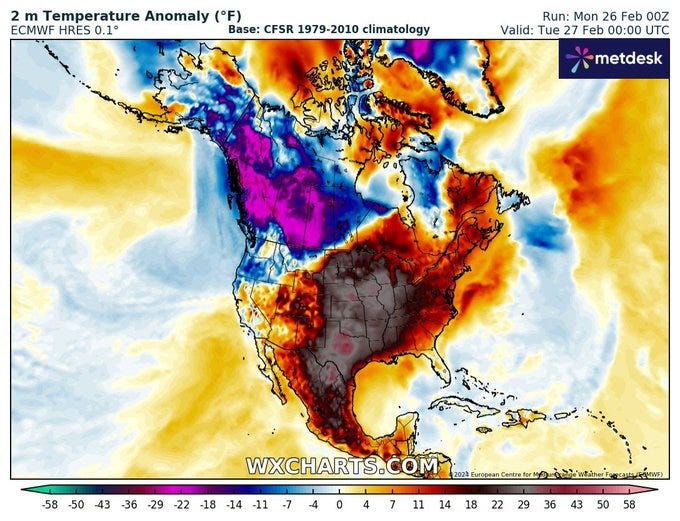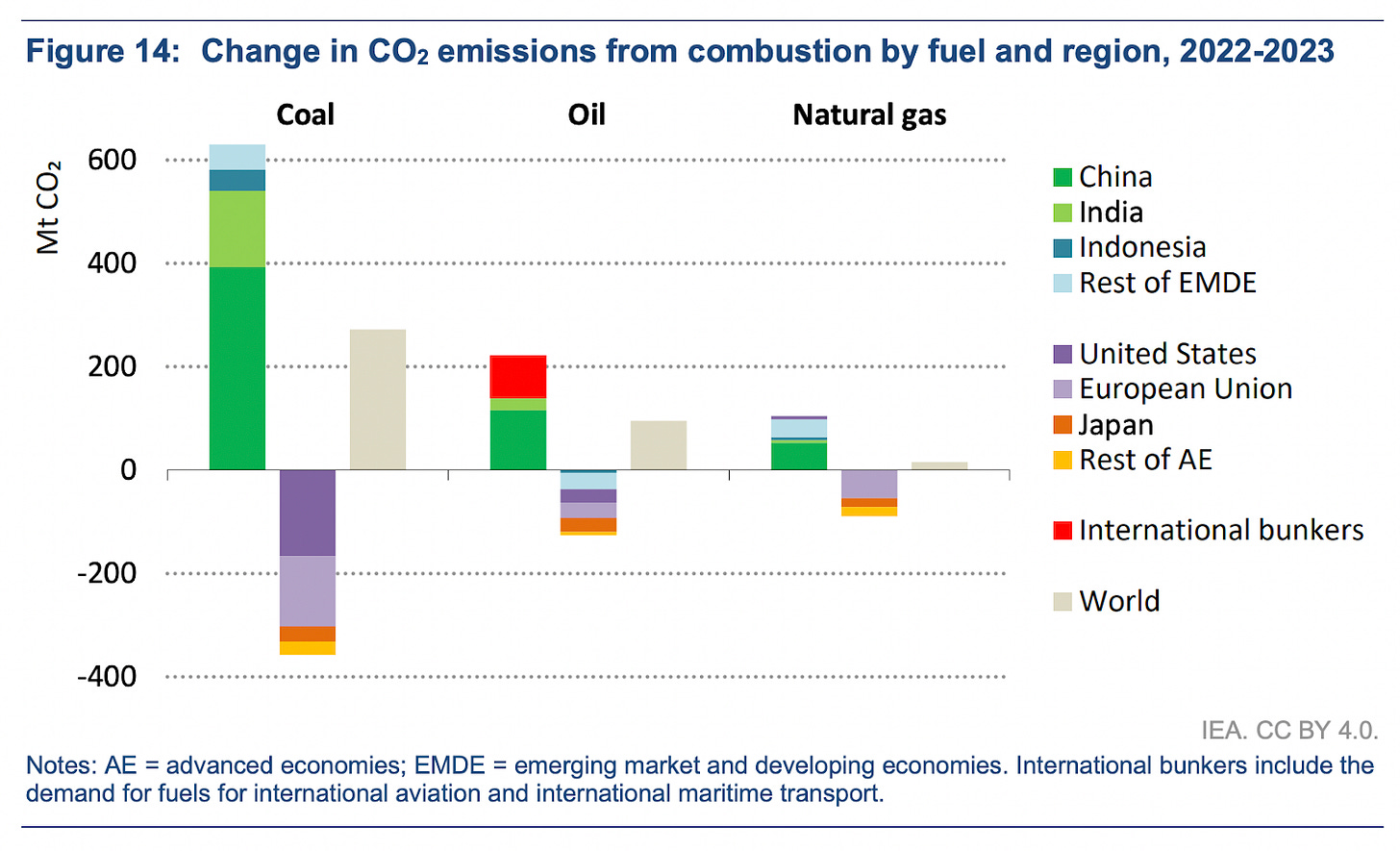Last Week in Collapse: February 25-March 2, 2024
Deaths climb in Gaza, Texas burns, and bird flu reaches Antarctica.
Last Week in Collapse: February 25-March 2, 2024
This is Last Week in Collapse, a weekly newsletter compiling some of the most important, timely, useful, soul-crushing, ironic, stunning, or otherwise must-see/can’t-look-away moments in Collapse.
This is the 114th newsletter. You can find the February 18-24 edition here if you missed it last week. Thank you for subscribing to the Substack.
——————————
Drought is threatening risotto rices in Italy, and rice harvests in Vietnam. Meanwhile, Mexico City is rapidly approaching “day zero,”, the moment when their water runs out. When the earth heats up 3 °C (expected around 2070), the Himalayas are predicted to face a year(s) long Drought, and pollination will decrease by 50%. Water shortages have already come to the Cyclades islands in Greece.
Everything’s bigger in Texas—including the wildfires. A state of emergency was declared in part of Texas, after growing wildfires encroached on an atomic weapons factory and disassembly site. The weapons are reportedly secure, but hundreds of people have been evacuated and thousands left without power and/or water. One of the wildfires is the 2nd biggest in U.S. history, burning over 1.1M acres; it is currently “3% contained.”

In the central Amazon, Drought is impacting local farmers. A hailstorm in Uganda destroyed the crops of hundreds of farmers. A study into the declining population of humpback whales in the Pacific Ocean from 2002-2021 concluded that marine heat waves may have killed off much of their food, leading to malnourished whales unwilling/unable to reproduce in large numbers.
A winter heat wave surged into Mexico and middle America, breaking records for winter temperatures in many locations. 80 °F (26.6 °C) in Omaha, 73 °F (23.7 °C) in Detroit… and the Atlantic Ocean is seeing record high temperatures for March—about 2 °F hotter than usual. And Sri Lanka’s capital, Columbo, broke a 109-year record for the hottest February temperature: 36.2 °C (97 °F). Switzerland saw its hottest February since records began 160 years ago.
Meltwater from Yukon glaciers has been analyzed, and determined to contain large concentrations of methane, previously not thought to be there in such quantities. Concentrations of CH4 in the glacial meltwater were about 250% greater than in the air. And the concentration of cold winter air in the Northern Hemisphere is at almost record lows.
Bangladesh is at the forefront of climate change, spending 7% of its budget on adaptation measures. However, experts say they will have to spend 7x that number by 2050 to handle the devastating changes coming. The Thwaites Glacier lost its sea ice tongue; an ice tongue is a giant piece of ice attached to a glacier.
Switzerland’s proposal to the UN to consider solar geoengineering was poo-pooed by other states, and Switzerland was pressured into withdrawing its proposal. Scientists are conflicted as to whether the experimental technology holds more promising advantages than drawbacks. A recent study on aerosol geoengineering possibilities to reflect sunlight back determined that it wouldn’t be enough to manage rising temperatures, considering that there is already so much heat trapped within our oceans, and the AMOC has already begun to destabilize.
The International Energy Agency (IEA) announced that CO2 emissions released in 2023 were less than in 2022. Notable emitters include China, India, and the U.S. The full, 24-page report has more details.
“Advanced economy GDP grew 1.7% but emissions fell 4.5%, a record decline outside of a recessionary period. Having fallen by 520 Mt {million tonnes} in 2023, emissions are now back to their level of fifty years ago….Emissions in China grew around 565 Mt in 2023, by far the largest increase globally and a continuation of China’s emissions-intensive economic growth….Total energy-related CO2 emissions increased by 1.1% in 2023. Far from falling rapidly - as is required to meet the global climate goals set out in the Paris Agreement - CO2 emissions reached a new record high of 37.4 Gt in 2023….El Niño brought about warmer and drier conditions in Canada and the North-West of the United States, where half of the national hydropower capacity is situated….there has been significant coal-to-gas switching, with the share of natural gas in electricity generation rising from 22% to 31%....India surpassed the European Union to become the third largest source of global emissions in 2023. Countries in developing Asia now account for around half of global emissions, up from around two-fifths in 2015 and around one‑quarter in 2000. China alone accounts for 35% of global CO2 emissions.”
Deforestation in the Philippines is being blamed for landslides and flooding. Scientists say that secret roadways are accelerating deforestation in the Amazon, allowing loggers to access untouched parcels of trees. The UN is forecasting massive growth in the extraction industry by 2060. Australia is dealing with a wildfire in Victoria that has forced tens of thousands of people to evacuate.
A study in Science concerning far north rivers concluded that anthropogenic climate change is reducing seasonal variance in river flow, which could disrupt fish migration/breeding patterns. British & Irish rivers are in a state of pollution, according to the Rivers Report 2024. A study in Nature suggests that El Niño will have particularly strong effects on “the Bay of Bengal and the South China Sea, as well as Alaska, the Caribbean Sea, and the Amazon.” El Niño is also blamed for the record-setting sea surface average temperatures. The warming of seawater is also triggering phytoplankton booms earlier than usual, with consequences for aquatic life.
A study from the European Geosciences Union examined the relationship between Arctic meltwater in the Atlantic Ocean and European temperatures. It concluded that hotter & drier summers in Europe may be predicted months in advance by gauging the meltwater in the Atlantic, itself caused by rising temperatures and CO2 concentrations. The study also claims that southern Europe will likely have an especially hot & dry summer this year.
Several locations in the Pacific had their hottest February night on record. Thailand in particular has seen 11 months of records broken in one way or another. An unseasonably cold winter in China is stressing crops like peanuts and cucumbers.
——————————
South Korean doctors, on strike for a couple weeks, are facing threats from the government that they will lose their medical licenses if they don’t return to their jobs. Cuba’s government has petitioned the WFP to send food aid, as hunger worsens. Dengue fever is spreading hugely in Argentina—over 2500% more cases now compared to last year.
Long COVID is being recognized as a legitimate illness more and more among the political and medical community. Nobody is sure how many people develop Long COVID symptoms, but some research indicates it’s around 10%. Other sources place the number around 25%, a number which grows with each subsequent infection. The new CDC guidelines on isolating based on symptoms instead of transmissibility basically guarantees that COVID will be around indefinitely. It will be a part of the homo sapiens story forever.
On average, Long COVID drops a person’s IQ by about 6 points. Doctors recommend that older people should get another booster, and a recent study in Nature Communications affirms that “Completely vaccinated and patients with booster dose of vaccines did not incur significant higher risk of health consequences…whilst un-vaccinated and incompletely vaccinated patients continued to incur a greater risk of clinical sequelae for up to a year following SARS-CoV-2 infection.”
Obesity rates are growing; today, over 1 billion humans (15%+) are classified as obese. Ghana has now criminalized identifying as LGBT+ with a 3-year prison sentence. Misery has grown in the Rohingya refugee camps, where disease and conscription have become more common.
China’s growing real estate crisis is threatening the stability of the economic system, propped up by “shadow banks” and unregulated loans. North Korea is trading weapons for food from Russia. Sri Lanka is ending the extended visas for Russians hiding living in the country, a number that some estimate could surpass 200,000.
AI bots have allegedly swarmed Twitter X with spam—not to mention propaganda. War and trade problems are holding back the world economy, according to the WTO.
India’s economy reportedly grew 8.4% in Q4, 2023. A study on microplastics in lakes measured how they tend to sink to the bottom, and may become a measure marker in the Anthropocene epoch for soil researchers of the future. In Papua New Guinea, fuel shortages unfold. South Sudan’s fragile economy may Collapse if they can’t repair & maintain their oil pipelines. Disruptions in the Red Sea are impacting the supply of oil tankers available.
Food prices surge in Iraq. Polish farmers sabotaged 160M tonnes of Ukrainian grain over disagreements with EU policies. Growing farmers protests appear likely to influence the EU Parliamentary elections this June.
Keep reading with a 7-day free trial
Subscribe to Last Week in Collapse to keep reading this post and get 7 days of free access to the full post archives.












